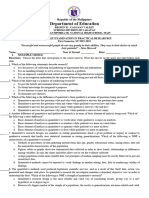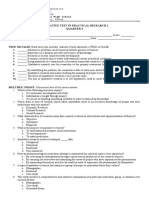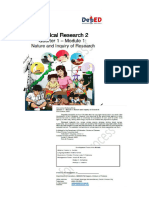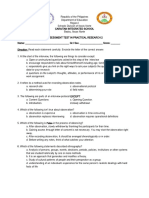0 ratings0% found this document useful (0 votes)
21 viewsQuiz No 4 Practical Research 1
Quiz No 4 Practical Research 1
Uploaded by
Omairah S. MalawiThis document is a quiz for a Practical Research 1 class covering lessons 4 and 5. It contains 10 multiple choice questions testing understanding of key concepts in qualitative research such as conducting research in a naturalistic manner, purposive participant selection, characteristics of qualitative research, strengths and weaknesses related to sample size, objectives of phenomenological research, and fields where qualitative research can be beneficial. The quiz is to be completed by a student including their name, grade level, and section.
Copyright:
© All Rights Reserved
Available Formats
Download as DOCX, PDF, TXT or read online from Scribd
Quiz No 4 Practical Research 1
Quiz No 4 Practical Research 1
Uploaded by
Omairah S. Malawi0 ratings0% found this document useful (0 votes)
21 views2 pagesThis document is a quiz for a Practical Research 1 class covering lessons 4 and 5. It contains 10 multiple choice questions testing understanding of key concepts in qualitative research such as conducting research in a naturalistic manner, purposive participant selection, characteristics of qualitative research, strengths and weaknesses related to sample size, objectives of phenomenological research, and fields where qualitative research can be beneficial. The quiz is to be completed by a student including their name, grade level, and section.
Original Title
Quiz-No-4-Practical-Research-1
Copyright
© © All Rights Reserved
Available Formats
DOCX, PDF, TXT or read online from Scribd
Share this document
Did you find this document useful?
Is this content inappropriate?
This document is a quiz for a Practical Research 1 class covering lessons 4 and 5. It contains 10 multiple choice questions testing understanding of key concepts in qualitative research such as conducting research in a naturalistic manner, purposive participant selection, characteristics of qualitative research, strengths and weaknesses related to sample size, objectives of phenomenological research, and fields where qualitative research can be beneficial. The quiz is to be completed by a student including their name, grade level, and section.
Copyright:
© All Rights Reserved
Available Formats
Download as DOCX, PDF, TXT or read online from Scribd
Download as docx, pdf, or txt
0 ratings0% found this document useful (0 votes)
21 views2 pagesQuiz No 4 Practical Research 1
Quiz No 4 Practical Research 1
Uploaded by
Omairah S. MalawiThis document is a quiz for a Practical Research 1 class covering lessons 4 and 5. It contains 10 multiple choice questions testing understanding of key concepts in qualitative research such as conducting research in a naturalistic manner, purposive participant selection, characteristics of qualitative research, strengths and weaknesses related to sample size, objectives of phenomenological research, and fields where qualitative research can be beneficial. The quiz is to be completed by a student including their name, grade level, and section.
Copyright:
© All Rights Reserved
Available Formats
Download as DOCX, PDF, TXT or read online from Scribd
Download as docx, pdf, or txt
You are on page 1of 2
Department of Education
Schools Division of Tacloban City
LEYTE NATIONAL HIGH SCHOOL
Senior High School
Tacloban City
2nd Semester, SY: 2022-2023
QUIZ (LESSON 4 & 5) IN PRACTICAL RESEARCH 1
Name: _______________________________________________ Grade level & section:
______________
A. MULTIPLE CHOICE. Read each statement carefully. Choose the letter of the best answer.
1. How can qualitative research be done in naturalistic manner?
a. It should control the data. c. It should focus on artificial responses.
b. It should manipulate the data. d. It should solicit responses from real-life
situations.
2. How can a researcher select participants in a purposive manner?
a. Select the participants randomly.
b. Select the participants by means of “draw lots.”
c. Select the participants who can pass the set criteria.
d. Select the participants based on mere convenience of the researcher.
3. Which of the following does not characterize qualitative research?
a. The research follows an inductive procedure.
b. The research focuses on personal experiences and insights.
c. The research considers a thick description of the gathered data.
d. The research is done using a linear and cause and effect relationship.
4. Why does the use of small number of participants become a weakness of a qualitative research?
a. It cannot be a source of data.
b. It requires more resources; hence, it is not cost-efficient.
c. It cannot provide detailed information of the phenomenon to be investigated.
d. It cannot provide sufficient information of the phenomenon to be investigated.
5. What is the strength of qualitative research?
a. Qualitative research is time consuming.
b. Qualitative research is more difficult to analyze.
c. Qualitative research cannot generalize the findings to the study population.
d. Qualitative research provides more detailed information to explain complex issues.
6. What is the objective of a phenomenological research?
a. to develop a theory
b. to understand the past events
c. to characterize the culture of the subjects
d. to explore the lived experiences of the subjects
7. Which of the following qualitative research requires an in-depth examination of an individual
subject?
a. narrative
b. historical
c. case study
d. grounded theory
8. Which of the following research requires an immersion?
a. narrative
b. historical
c. case study
d. grounded theory
9. What kind of qualitative research can be best done when the researcher seeks to conceptualize the
survivorship process of COVID-19 patients?
a. historical
b. ethnographic
c. grounded theory
d. phenomenological
10. Which if the following fields can qualitative research be beneficial?
a. business c. education
b. medicine d. all of the above
You might also like
- Diagnostic Test Practical Research 2Document4 pagesDiagnostic Test Practical Research 2Lubeth Cabatu88% (8)
- Practical Research 2 Final ExaminationDocument5 pagesPractical Research 2 Final ExaminationQuennee Ronquillo Escobillo71% (14)
- Key To Correction in PRACTICAL RESEARCH 2Document5 pagesKey To Correction in PRACTICAL RESEARCH 2leandrojigz0188% (105)
- All Chaps Final Combined PDFDocument418 pagesAll Chaps Final Combined PDFMuhammad Haseeb Javed100% (3)
- RA2302048 Kayrah Ali GBS GISMD (E-Portfolio)Document18 pagesRA2302048 Kayrah Ali GBS GISMD (E-Portfolio)MD KURBAN SHEIKHNo ratings yet
- Practical Research 2 First Quarter Assessment PDF FreeDocument8 pagesPractical Research 2 First Quarter Assessment PDF FreeRosario OcamiaNo ratings yet
- Second Semester First Quarter Exam Practical Research IDocument3 pagesSecond Semester First Quarter Exam Practical Research IMarvelyn Maneclang CatubagNo ratings yet
- Disciplines and Ideas in Social SciencesDocument11 pagesDisciplines and Ideas in Social SciencesArjane Grace SullanoNo ratings yet
- 1st Summative Test in Practical Research 1Document10 pages1st Summative Test in Practical Research 1HAZEL LABASTIDANo ratings yet
- Summative Test 1ST Q PR1Document4 pagesSummative Test 1ST Q PR1Claribel C. AyananNo ratings yet
- Practical Research 1Document4 pagesPractical Research 1Fely HablaNo ratings yet
- q3 Research 1 ExamDocument3 pagesq3 Research 1 ExamHAZEL LABASTIDANo ratings yet
- PR2-long QuizDocument4 pagesPR2-long QuizZyra AndoyNo ratings yet
- Summative PR2Document6 pagesSummative PR2ZHENJOON LOVENo ratings yet
- Department of Education: Summative Assessment in Practical Research Ii First Quarter, First Semester, SY 2020-2021Document4 pagesDepartment of Education: Summative Assessment in Practical Research Ii First Quarter, First Semester, SY 2020-2021Jenny Vhie S. VinagreraNo ratings yet
- TQ Practical Research.1Document3 pagesTQ Practical Research.1Sisley Canillo100% (1)
- Practical Research 2 2nd Quarter Summative TestDocument5 pagesPractical Research 2 2nd Quarter Summative TestJenalyn Miranda Cayanan - MarayagNo ratings yet
- First Periodical Test Research1 KeyDocument6 pagesFirst Periodical Test Research1 KeyMhildzky Canon89% (9)
- 3rd Quarter ExamDocument7 pages3rd Quarter ExamJaybe Movilla100% (1)
- 1stQE PR1Document4 pages1stQE PR1Ron AguilaNo ratings yet
- Sum4 pr1Document1 pageSum4 pr1eestoqueNo ratings yet
- PRACTICAL RESEARCH 2 - 1ST QUARTER (Students' Copy)Document5 pagesPRACTICAL RESEARCH 2 - 1ST QUARTER (Students' Copy)Zen Candia100% (1)
- 3rd Monthly Examination - RSRCH1Document5 pages3rd Monthly Examination - RSRCH1Marc AguinaldoNo ratings yet
- 1st Quarter Exam - PR2 SY 2022-2023Document5 pages1st Quarter Exam - PR2 SY 2022-2023Jenny Vhie S. VinagreraNo ratings yet
- PR1 3rd Quarter AssessmentDocument3 pagesPR1 3rd Quarter AssessmentLyka Besoyo100% (1)
- Directions: A. B. C. D.: Baay National High SchoolDocument14 pagesDirections: A. B. C. D.: Baay National High Schoolregor velascoNo ratings yet
- Exam in PR1Document9 pagesExam in PR1Maricar TelanNo ratings yet
- Practical Research 2 Module 1Document11 pagesPractical Research 2 Module 1Charry CervantesNo ratings yet
- Exam Practical Research 1 WordDocument7 pagesExam Practical Research 1 WordAILEEN M. OMAMALINNo ratings yet
- Name: - Date: - Grade 12 - Topaz ScoreDocument19 pagesName: - Date: - Grade 12 - Topaz Scoreregor velascoNo ratings yet
- 3 IsDocument5 pages3 IsFely HablaNo ratings yet
- Summative Test in Practical Research 1Document3 pagesSummative Test in Practical Research 1shyril santosNo ratings yet
- Quarterly Exam PR1Document2 pagesQuarterly Exam PR1Donabel ValdezNo ratings yet
- PR 1Document4 pagesPR 1Beverly YM ManaogNo ratings yet
- Mataas Na Paaralang Neptali A. GonzalesDocument8 pagesMataas Na Paaralang Neptali A. GonzalesDe Leon, Theodore Justine P.No ratings yet
- Assessment Part IIDocument3 pagesAssessment Part IImaeg07No ratings yet
- Research Activites For The MidtermDocument7 pagesResearch Activites For The Midtermrtfrnptpc4No ratings yet
- Midterm Exam in Practical Research 1SUMMATIVEDocument8 pagesMidterm Exam in Practical Research 1SUMMATIVEJonalyn BanezNo ratings yet
- Practical Research 1 Midterm Exam Sy 2022 2023Document7 pagesPractical Research 1 Midterm Exam Sy 2022 2023Karren RamosNo ratings yet
- PR21 StquarterDocument5 pagesPR21 Stquartermajamelyn36No ratings yet
- Test Questionnaire PracResearch2 Q2Document9 pagesTest Questionnaire PracResearch2 Q2Vanessa G. ManguilimotanNo ratings yet
- Q3 1st SUMMATIVE PR1Document2 pagesQ3 1st SUMMATIVE PR1NICHOLE DIANNE DIME. DIAZNo ratings yet
- Exam Ni Practical Research 2Document3 pagesExam Ni Practical Research 2REYNNo ratings yet
- Senior Practical Research 2 Q1 Module1 FINALDocument11 pagesSenior Practical Research 2 Q1 Module1 FINALjashmincorazon27No ratings yet
- PR2 WW1Document2 pagesPR2 WW1PATRICIA DENISE MARCOSNo ratings yet
- Exam Ni Practical Research 2Document3 pagesExam Ni Practical Research 2Ram KuizonNo ratings yet
- PR1 - Prelim ExamDocument4 pagesPR1 - Prelim ExamCheryl Mae BaliliNo ratings yet
- PR 2 - PrelimDocument3 pagesPR 2 - PrelimWilma Andus LapadNo ratings yet
- Midterm Examination in Practical Research 1Document14 pagesMidterm Examination in Practical Research 1Noel LafuenteNo ratings yet
- Mother Teresa Academy of Marilao, Bulacan IncDocument10 pagesMother Teresa Academy of Marilao, Bulacan IncNikko CarilloNo ratings yet
- 3RD QUARTER EXAMINATION ResearchDocument4 pages3RD QUARTER EXAMINATION ResearchMaria Erika Glenda Beltran50% (2)
- SUMMARY OF LEARNING2 - Practical Research1Document5 pagesSUMMARY OF LEARNING2 - Practical Research1bernardojrmoralNo ratings yet
- Practical Research I Booklet TypeDocument8 pagesPractical Research I Booklet TypeGabrielle EllisNo ratings yet
- 11 Practical Research 1Document4 pages11 Practical Research 1Joely E. De TorresNo ratings yet
- RDL Quiz UpdatedDocument2 pagesRDL Quiz UpdatedArielle TanNo ratings yet
- Midterm Exam in Practical Research 1Document7 pagesMidterm Exam in Practical Research 1Jonalyn BanezNo ratings yet
- Practical-Research-1 SumamtivessssDocument9 pagesPractical-Research-1 SumamtivessssChristine CastroNo ratings yet
- Research 2 - Exam Sheets Third QuarterDocument7 pagesResearch 2 - Exam Sheets Third Quartermackycharm.carduzaNo ratings yet
- Assessment Test in PR 2Document15 pagesAssessment Test in PR 2Den Gesiefer LazaroNo ratings yet
- Pr1 - 3rd Quarter Examination FinalDocument10 pagesPr1 - 3rd Quarter Examination FinalMa Melissa DelavinNo ratings yet
- Lesson Exemplar School Grade Level Teacher Learning Area Practical Research 2 Teaching Date Quarter Teaching Time No. of DaysDocument9 pagesLesson Exemplar School Grade Level Teacher Learning Area Practical Research 2 Teaching Date Quarter Teaching Time No. of DaysJovie Bitas DaeloNo ratings yet
- PR2 W1 PDFDocument19 pagesPR2 W1 PDFGeminiNo ratings yet
- Blended Learning in Practice: A Guide for Practitioners and ResearchersFrom EverandBlended Learning in Practice: A Guide for Practitioners and ResearchersAmanda G. MaddenNo ratings yet
- History IIIDocument6 pagesHistory IIIDashamiNo ratings yet
- Artikel Culture ShockDocument9 pagesArtikel Culture Shockainunr zkyNo ratings yet
- CSC Week 4 6Document42 pagesCSC Week 4 6Diana Pecore FalcunitNo ratings yet
- Wa0035.Document25 pagesWa0035.sharmaeklavya81No ratings yet
- WhatiscompetenceDocument5 pagesWhatiscompetenceDana Michele CastroNo ratings yet
- Table of Specification (Tos) : Republic of The Philippines Region 02 (Cagayan Valley)Document2 pagesTable of Specification (Tos) : Republic of The Philippines Region 02 (Cagayan Valley)Alyssa LoisNo ratings yet
- Machine Learning Based Solar Photovoltaic Power Forecasting A Review and ComparisonDocument27 pagesMachine Learning Based Solar Photovoltaic Power Forecasting A Review and Comparisonhassna ait aliNo ratings yet
- FINAL Data Base of Electrical Engineering Department For Tech MahindraDocument3 pagesFINAL Data Base of Electrical Engineering Department For Tech MahindraShubhadityaChakrabortyNo ratings yet
- NewdiscoveryDocument3 pagesNewdiscoveryChi NguyễnNo ratings yet
- Episode 10Document8 pagesEpisode 10Noviegen CardenteNo ratings yet
- Bion and babiesVUDocument6 pagesBion and babiesVUkarine botelhoNo ratings yet
- MilfontDuckitt2010 TodistributeDocument16 pagesMilfontDuckitt2010 TodistributeNanle WetpinNo ratings yet
- Sources of Curriculum - FinalDocument31 pagesSources of Curriculum - FinalShun Dee Lebico100% (1)
- G-12 Language Used in Academic Texts From Various DisciplinesDocument7 pagesG-12 Language Used in Academic Texts From Various DisciplinesShirley D. Capili LptNo ratings yet
- Management TheoriesDocument12 pagesManagement TheoriesNanle WetpinNo ratings yet
- EE4503 Power Engineering Design - OBTLDocument6 pagesEE4503 Power Engineering Design - OBTLAaron Tan100% (1)
- Q1 Sept 5 - Creative Tech Day 4Document2 pagesQ1 Sept 5 - Creative Tech Day 4Riza Bustamante AcedoNo ratings yet
- Dissertation Project Report at Apollo HospitalsDocument65 pagesDissertation Project Report at Apollo Hospitalsbhavesh jadhavNo ratings yet
- Course-Content MSAIDocument7 pagesCourse-Content MSAIAsany HerdianaNo ratings yet
- IE5005 Lecture 00Document32 pagesIE5005 Lecture 00Braewyn HsuNo ratings yet
- Interview Related PDFDocument40 pagesInterview Related PDFArkya GhoshNo ratings yet
- Coping Mechanism and Psychological Resiliency of Senior High School StudentsDocument33 pagesCoping Mechanism and Psychological Resiliency of Senior High School StudentsCharie Rose DongsalNo ratings yet
- Interview Types and Approaches Pr1Document26 pagesInterview Types and Approaches Pr1Albyra Bianca Sy TamcoNo ratings yet
- A. Definition of "University at Life"Document9 pagesA. Definition of "University at Life"SaadNo ratings yet
- JIUP - Deny ArdiantoDocument14 pagesJIUP - Deny Ardiantom84005254No ratings yet
- Project - Based LearningDocument12 pagesProject - Based LearningAgustina Sarti100% (1)
- 2017 - History of JEL Classification - CherrierDocument37 pages2017 - History of JEL Classification - CherrierJuan Manuel Báez CanoNo ratings yet

























































































